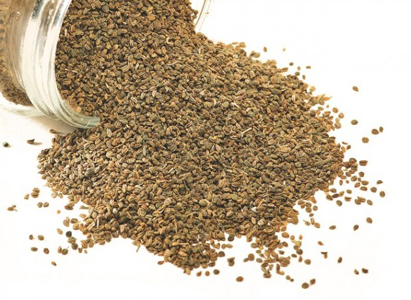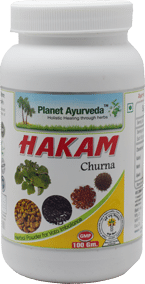Ajwain, Carom Seeds (Trachyspermum Ammi)

Description of Plant
In the field of medicine, use of plants as medicines is as old as human development. These plants have various bioactive substances that help to eradicate the state of ailments. Yavani is one of these plants with medicinal properties. This herb belongs to the family Apiaceae. Yavani is also known as Trachyspermum ammi, its scientific name. Yavani grows in dry or semi-dry regions where soil is full of salt contents. Yavani is a kind of herbaceous perennial plant that grow annually. This plant is copiously branched with a stem that is very much streak. On the other hand, the leaves of the plants are somewhat distant with two to three in number. These leaves divide pinnately with linear segments. The stem is covered with an umbel, having inflorescence nature. The umbel have 16 umbellets. The 16 umbellets further consists 16 flowers. The flowers are of white colour and very small. These are known to be actinomorphic. The flowers consists bi lobe petals which are present alternative to the stamens. Both the petals and the stamens are five in number. The ovary of the plant is present inferiorly with a knob like stigma. The fruits of the plants are of ovoid and cordate shape, have aromatic cremocarp with a steady stylopodium. These are of greyish brown colour. Fruits contain two mericarps, component of the fruits, are compressed, 2mm long and 1.7mm wide. Each of the mericarp has clearly distinct five ridges and six vittae. It has tubular surface which shows the presence of one seed.
General Description
Yavani is the native herb of Egypt. Yavani is known with other common name also such as Ajwain, Bishop’s Weed, Ajowan and more. This herb is widely distributed in whole parts of the world. Yavani is a Sanskrit name of the herb, as it has been used in India since ancient times. In Ayurveda, it is believed to manage vata and kapha. It helps to increases pitta.
The whole plant involves in treating ailments as every part has some kind of active components to cure diseases. The roots of the plants have diuretic activity. The seeds of the plants are known as aphrodisiac, anti-microbial, fungicide, anti-aggregatory. These also tend to decrease lack of appetite, gastro-intestinal infections and respiratory ailments. The fruits of the plant also have capacity to fight as these contain antispasmodic, stimulative and carminative properties, help to cure abdominal diseases and piles.
The plant can eradicate ailments with the effect of phytochemicals present in the plant parts. Seeds of the plant contain flavone, saponins, tannins, glycosides, fats, fibers, proteins, carbohydrates, various minerals like calcium, cobalt, manganese, copper, iron, phosphorous and more. It also contain vitamins like vitamin C, vitamin B complex and more. The essential oil of the plant contain various important active elements. The composition of the essential oil can vary with the regions where it found and made. On the general basis essential oil contains approximately 26 chemicals like the main ingredient thymol, oleic acid, linoleic acid, p-cymene, b-pinene, y-terpinene, tepinene-4-ol, palmitic acid, xylene and more. Its hydrodistilled oil, 8 components are their like thymol, p-cymene, y-terpinene, bi-pinene, limonene and more. The fruits of the plant contain carvacrol, thymol, p-cymene, dipentene, α-terpenine and y-terpinene.
Classification
- Kingdom: Plantae
- Subkingdom: Tracheobionota
- Division: Magnoliophyta
- Class: Magnoliopsida
- Subclass: Rosidae
- Order: Apiales
- Family: Apiaceae
- Genus: Trachyspermum
- Species: Ammi
Habitat
It is cultivated in dry or semi dry areas mainly. It the native of Egypt. It now grows in countries like Iran (eastern regions of Baluchistan), Pakistan, Iraq, Afghanistan and India. In India, it is cultivated in areas of Rajasthan, West Bengal, Maharashtra, Gujarat, Punjab, Bihar, Uttar pradesh and Madhya pradesh.
Names of Yavani
- Sanskrit name – Yamini, Yaminiki, Yaviniki, Deepyaka, Bhutika, Ajamodika
- English name – Bishop’s weed, Carom Seeds
- Hindi name – Ajwain, Jevain
- Marathi name – Onva
- Kannada name – Oma, Yom, Omu
- Tamil name – Omam
- Gujrati name – Ajma, Ajmo, Yavan, Javain
- Telugu name – Vamu
- Punjabi name – Jabain, Ajvain, Ajowan
- Bengali name – Yamani, Yauvan, Yavan, Javan, Yavani, Yoyana
- Malayalam name – Oman, Ayanodakan
- Oriya name – Juani
- Russian name – Aiova, Azhgon
- Assamese name – Jain
- South Khorasan name – Ajgho
- Baluchi name – Ajowan and Spirca
- Dutch name – Ajowan
- Farsi name – Nanakhaha
- Malaysia name – Oman
- French name – Ajowan, Ajouan, Ammi
- Arabic name – Khella, Kamme Muluki, Kyunulmuluki
- Persian name – Nankhah, zenian, khordaneh,
- German name – Ajowan, Adiowan
- Thai name – Phak chi
- Hungarian name – Ajovan
Ayurvedic Properties
| Hindi / Sanskrit | English | ||
| Rasa | Katu, Tikta | Taste | Pungent, Bitter |
| Guna | Laghu, Rooksha, Teekshna | Physical Property | Light, Dry, Sharp |
| Virya | Ushna | Potency | Hot |
| Vipaka | Katu | Metabolic Property (After Digestion) | Pungent |
Effect on doshas
It helps to maintain kapha and vata. It increases the efficiency of pitta.
Classical Categorization
| Charak Samhita | Sushrut Samhita |
|
Shulaprashamana – Herbs that relieve colic, pain |
– |
Ancient Verse About Yavani

Bhavprakash Nighantu Edition of 1998: verse 75-76, page no-25-26.
It states the names and the properties of the plant Yavani. It has various names like Yavanaka, Ugargandha, Brahmadarbha, Ajamodika, Deepyaka, Deepai and Yavasahva.
This is known to improve digestion, taste, as it is sharp and hot, pungent, light, so promotes digestive fire and treats anorexia. It increases pitta. Its excess can destroy sperms. It is good for abdominal pain, indigestion, spleen disorders and worm infestation.
References
The Bhavprakash nighantu with elaborated Hindi commentary by Padmashri prof. K.C. Chunekar, edited by Dr. G.S. Pandey: edition of 1998; verse 75-76, page no- 25-26.
Practical Uses of Yavani
Analgesic
This herb shows positive analgesic effects and it is of opioid type.
Antimicrobial
The methanol extract of the plant shows great effect on the gram positive and gram negative microbes such as on multi-drug resistant Salmonella typhi. Thymol chemical present in the plant tends to inhibit the activity of the microbes.
Antispasmodic and hepatoprotective
The chemicals present in the plant, shows effect on the calcium channels by blocking it.
It shows properties of hepato protection by normalizing the levels of liver enzymes.
Anti-inflammatory
The seeds of the plant shows anti-inflammatory activity.
Gastro-intestinal effects
The fruits shows effects on abdominal pain and gastric ulcers.
Shows protease activity
It acts as digestive tonic and effective to treat stomach and small intestine problems.
Anti-tussive effect
The plant shows effect on the problem of coughing.
Shows Antiplatelet-aggregatory effect
The dried extract of seeds of the Yavani, inhibits the aggregation of platelets.
Anti-filarial activity
The methanol extracts of fruits shows activity against Setaria digitata worms, adult S. digitata, human filarial worm and more.
Anti-Hyperlipidemic Effect
The plant has great anti-hyperlipidemic effect.
Anti-Fertility Effects
Fruits extracts have significant dose-dependent anti-fertility effects.
Bronchodilator Effect
Boiled extract of the plant shows bronchodilator effect on asthmatic airways.
Some other uses
The oil of the plant is used to give relief from joints pain. It also use to cure wounds.
The plant water is distilled to cure disorders like flatulence, low appetite and indigestion.
Parts Used
Fruits, Seeds
Dosage
- Fruits – 1 to 3 grams
- Oil – 1 to 3 drops
- Distilled – 5 to 10 drops
Ayurvedic Products from Yavani
Planet Ayurveda has Hakam Churna products in which Yavani is using as herbal formulation.
Hakam Churna
A wonderful formulation useful in treating morning stiffness, back pain, joint pains, osteoarthritis, cervical spondylitis and rheumatoid. It uses Yavani as one of the herbs, in this churna.
Caution to be Taken
Best to avoid Yavani use in people with oligospermia and male infertility.




